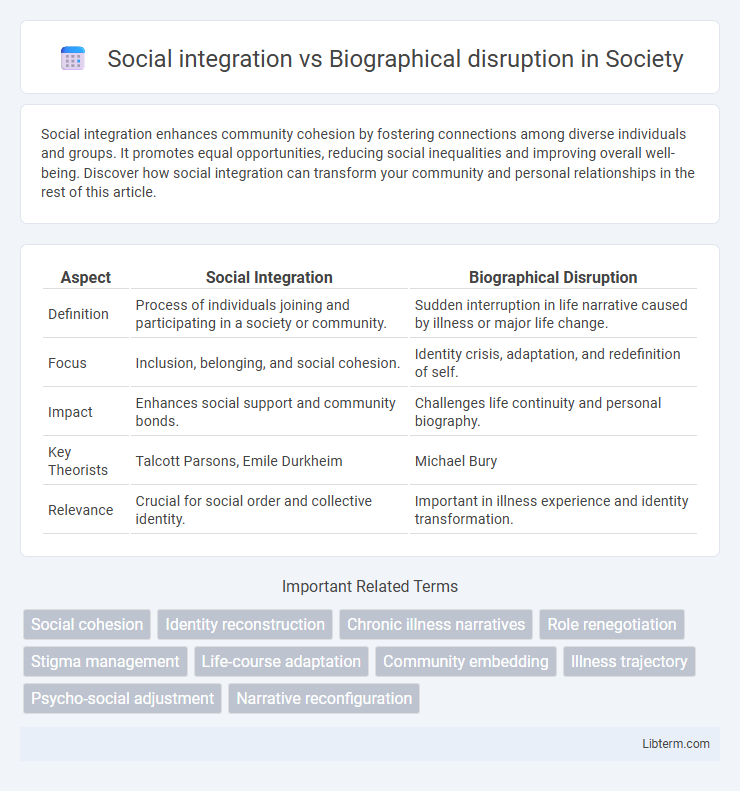Social integration enhances community cohesion by fostering connections among diverse individuals and groups. It promotes equal opportunities, reducing social inequalities and improving overall well-being. Discover how social integration can transform your community and personal relationships in the rest of this article.
Table of Comparison
| Aspect | Social Integration | Biographical Disruption |
|---|---|---|
| Definition | Process of individuals joining and participating in a society or community. | Sudden interruption in life narrative caused by illness or major life change. |
| Focus | Inclusion, belonging, and social cohesion. | Identity crisis, adaptation, and redefinition of self. |
| Impact | Enhances social support and community bonds. | Challenges life continuity and personal biography. |
| Key Theorists | Talcott Parsons, Emile Durkheim | Michael Bury |
| Relevance | Crucial for social order and collective identity. | Important in illness experience and identity transformation. |
Understanding Social Integration
Understanding social integration involves examining how individuals maintain connections within their communities despite experiences of biographical disruption, such as illness or major life changes. Social integration encompasses participation in social networks, access to support systems, and engagement in cultural or community activities that reinforce a sense of belonging. This process helps mitigate the effects of biographical disruption by promoting resilience and continuity in personal identity.
Defining Biographical Disruption
Biographical disruption refers to the profound disturbance in an individual's life narrative and self-identity caused by chronic illness or significant life events, challenging previously held assumptions and life plans. It involves a critical reevaluation of personal goals, relationships, and social roles, often leading to a restructured sense of self and future orientation. Understanding biographical disruption is essential for addressing the psychological and social impacts of illness, distinguishing it from social integration which emphasizes maintaining or adapting social connections and roles amid life changes.
Historical Perspectives on Social Integration
Historical perspectives on social integration emphasize the dynamic processes through which individuals adapt to societal norms and foster cohesion within communities, often contrasting with the concept of biographical disruption, which highlights significant life changes that challenge these adaptations. Social integration theories trace back to Durkheim's work on social cohesion and collective consciousness, underscoring the importance of shared values and social roles in maintaining stability. Over time, historical analyses reveal how periods of rapid social change, such as industrialization or migration, have reshaped integration patterns, complicating the continuity of individual life courses and intensifying experiences of biographical disruption.
Origins of the Biographical Disruption Concept
The concept of Biographical Disruption was first introduced by sociologist Michael Bury in 1982 to describe the profound impact chronic illness exerts on an individual's life narrative and self-identity. This framework contrasts with Social Integration theories, which emphasize the role of societal connections and support systems in maintaining normalcy despite health challenges. Bury's work highlighted how sudden illness disrupts established life trajectories, necessitating a re-evaluation of personal biography and social roles.
Key Differences Between Social Integration and Biographical Disruption
Social integration involves the process through which individuals participate in social networks and maintain roles within a community, promoting stability and continuity in identity. Biographical disruption refers to the profound interruption of an individual's life narrative caused by significant events, such as chronic illness, leading to a reassessment of self and future plans. Key differences include social integration's emphasis on maintaining social roles and support systems versus biographical disruption's focus on the transformative impact of life-altering events on personal identity and life trajectories.
The Impact of Illness on Life Narratives
Social integration reflects how individuals maintain connections and roles within their communities during illness, preserving a coherent life narrative despite health challenges. Biographical disruption describes the interruption of a person's expected life course due to illness, necessitating the reconstruction of identity and future plans. The impact of illness on life narratives involves navigating these tensions between continuity and change, where social support and personal meaning-making are crucial to adapting and reconstructing one's story.
Social Support Networks and Identity Reconstruction
Social integration strengthens Social Support Networks by fostering relationships that provide emotional, informational, and practical assistance, crucial for maintaining well-being during life changes. Biographical disruption challenges existing Identity Reconstruction processes by forcing individuals to redefine self-concepts and roles, often relying heavily on social support to navigate uncertainty. Effective recovery hinges on the interplay between robust social networks and adaptive identity shifts, enabling resilience in the face of personal upheaval.
Challenges in Achieving Social Integration After Disruption
Challenges in achieving social integration after biographical disruption include navigating identity reconstruction amid altered self-perceptions and social roles. Individuals often face stigma and loss of social networks, hindering acceptance and reestablishment within communities. Barriers in accessing support systems and adapting to new social expectations complicate the reintegration process.
Strategies for Navigating Biographical Disruption
Strategies for navigating biographical disruption include developing adaptive coping mechanisms, seeking social support networks, and reconstructing personal identity to accommodate new life circumstances. Effective integration into social environments promotes resilience and psychological well-being, facilitating a smoother transition through life-altering events. Practical techniques such as narrative therapy and goal restructuring help individuals to regain control and meaning after disruption.
Future Directions in Research on Social Integration and Biographical Disruption
Future research on social integration and biographical disruption should explore the dynamic interplay between evolving social networks and identity reconstruction after major life changes. Emphasis on longitudinal studies can illuminate how adaptive strategies and social support systems influence resilience and mental health outcomes over time. Advancements in digital connectivity provide new contexts for examining how virtual communities contribute to or mitigate biographical disruption in diverse populations.
Social integration Infographic

 libterm.com
libterm.com